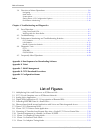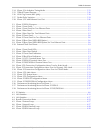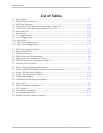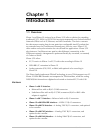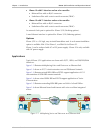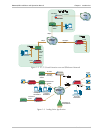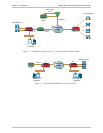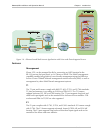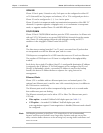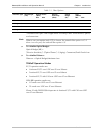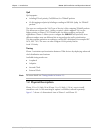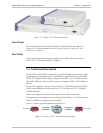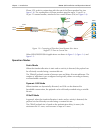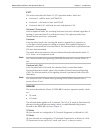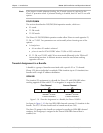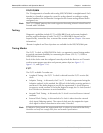
Chapter 1 Introduction IPmux-1/1E Installation and Operation Manual
1-6 Overview
ISDN BRI
IPmux-1E has 4-ports, S-interface only. Each port can be configured as either NT
or TE (Network/User) by jumper and software; NT or TE is configured per device.
IPmux-1E can be configured to 1, 2, 3 or 4 active ports.
IPmux-1E works in transparent mode (no termination/compression of the BRI “D”
channels). It operates opposite a Megaplex unit, as a concentrator in transparent
mode, or opposite another IPmux-1E with ISDN BRI ports.
FXS/FXO/E&M
IPmux-1E has 4 FXS/FXO/E&M interface ports for POTS connection. An IPmux unit
with an E1/T1 CAS interface can groom FXS/FXO/E&M channels from the remote
sites. IPmux-1E analog options interwork with Megaplex analog and E1/T1
modules via the Megaplex TDMoIP main link (ML-IP)
IP
The data stream coming from the E1 or T1 port is converted into IP packets that
are transported over the Fast Ethernet port, and vice versa.
TDM bytes are encapsulated in a UDP frame that runs over IP and over Ethernet.
The number of TDM bytes in an IP frame is configurable for throughput/delay
tradeoff.
Each device has a single IP address (Host IP). A configurable destination IP address
is assigned to the IP packets. IP ToS field support can be configured for IP Level
Priority. In Redundancy Mode, a secondary IP Address is used for the backup
bundle; this device IP Address defines a response for a ping, but not for
management.
Ethernet Ports
IPmux-1/1E is available with two Ethernet ports (user and network ports). The
optional user Ethernet port is used for user LAN connectivity/access, in addition to
the TDM service connectivity.
The Ethernet ports work in either transparent bridge mode or in a second mode
that enables user port rate limiting.
The Ethernet network port can be either UTP or fiber. The Ethernet user port is
UTP only.
• Fiber option – standard 100BaseFx full-duplex port (see Table 1-1).
• UTP option – A standard 10/100BaseT half/full-duplex port with
auto-negotiation support. If auto-negotiation is disabled, Ethernet mode should
be configured.
Half-duplex operation in the IPmux-1/1E network port is not recommended,
because collisions and backoffs cause large delay variation and may exceed the
delay variation buffer tolerance at the receiving end, causing buffer underflows and
errors to occur.
Note



